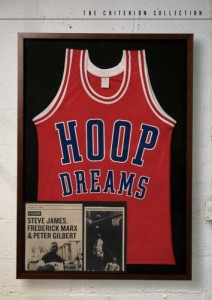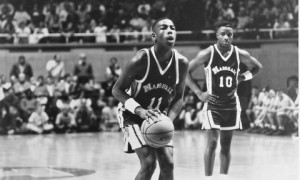Hoop Dreams
Hoop Dreams is an extraordinary documentary about two boys who dream of becoming professional basketball players but certain life decisions and the environment they live in make it somewhat impossible for these boys to reach their dream. They do however show great agency. They show that hard work can actually get them places. Both William and Arthur work religiously on improving their skills in basketball, which eventually gets them both a spot on the basketball team at St. Joseph’s High School. This is a great opportunity for both of them, but unfortunately Arthur’s grades and his parent’s inability to pay the tuition ultimately means his departure from the school and he must go to his local high school. Even though they are going to different schools they both show agency in that they both do fairly well on their school’s basketball teams.
Tragedy strikes when William gets a knee injury and cannot play for a while, this ends up bringing down his spirits and he starts to doubt himself and his grades drop dramatically. He is also under quite a bit of pressure from his coach and because during this time his daughter is born. If he had been more careful he might not have injured himself and he might not have had a child, if he had been more cautious he might even be in the NBA right now. These factors definitely hindered him towards reaching his dream. Arthur on the other hand refuses to really try in school so he ends up failing some of his classes. This could be due to the fact that the school did not really encourage their students to do well and the school’s resources were limited because it was a poorer inner city public school, but it could also be because he spent all of his time playing basketball. Since basketball was his passion then practicing was definitely important, but his complete lack of care for his school work ended up ruining his chances for getting picked to be on a team at a top university, and could have ultimately ruined his chances of being drafted to the NBA.
These boys definitely had the talent, and if their talent was the only factor then they might well be in the NBA today but the hardships they faced definitely held them back. Steve James chose these two boys to depict individual agency because in the environment they lived in and the hardships they faced, these boys needed agency to be able to succeed in any way. Had they not had any agency then they might not have gone to college or have become so talented at basketball.





